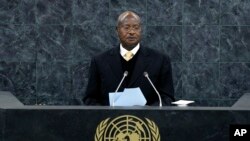KAMPALA —
Human Rights Watch says Uganda’s government has failed to deliver on its promise to effectively address corruption despite good technical work by investigators and prosecutors.
The report, entitled “Letting the Big Fish Swim," points out that no high-ranking Ugandan government official, minister or political appointee has ever served prison time for corruption while anti-corruption activists often face harassment and arrest.
In the report released Monday, the watchdog group said those who do stand trial in Uganda’s numerous corruption scandals tend to be low-level public employees whose conviction is unlikely to change the way the system works.
Human Rights Watch’s Maria Burnett says cases against high-level officials tend not to proceed at all, largely due to political interference and intimidation.
“Why is that that those cases don’t end up before the courts despite the rumor, the discussion, the evidence in some cases?" Burnett said. "Our concern is that prosecutors face interference, harassment and threats, and that witnesses who have that kind of crucial evidence that they can bring to the table, those people are not safe to come forward.”
When Ugandan President Yoweri Museveni came to power 27 years ago, he vowed to fight corruption and has established anti-corruption institutions during his time in office. His government claims to be devoted to rooting out graft.
But despite such pledges, Burnett says Museveni himself has often intervened on behalf of high-level officials facing corruption charges.
“He has made public statements about quality of evidence, whether they’re innocent or guilty, in one case offering to pay for people’s legal fees," she said. "Given his dominance in public affairs, I think that’s very troubling.”
Burnett urges foreign donors to see beyond the government’s rhetoric, and to be more aware of the true scope of Uganda’s corruption problem.
The report, entitled “Letting the Big Fish Swim," points out that no high-ranking Ugandan government official, minister or political appointee has ever served prison time for corruption while anti-corruption activists often face harassment and arrest.
In the report released Monday, the watchdog group said those who do stand trial in Uganda’s numerous corruption scandals tend to be low-level public employees whose conviction is unlikely to change the way the system works.
Human Rights Watch’s Maria Burnett says cases against high-level officials tend not to proceed at all, largely due to political interference and intimidation.
“Why is that that those cases don’t end up before the courts despite the rumor, the discussion, the evidence in some cases?" Burnett said. "Our concern is that prosecutors face interference, harassment and threats, and that witnesses who have that kind of crucial evidence that they can bring to the table, those people are not safe to come forward.”
When Ugandan President Yoweri Museveni came to power 27 years ago, he vowed to fight corruption and has established anti-corruption institutions during his time in office. His government claims to be devoted to rooting out graft.
But despite such pledges, Burnett says Museveni himself has often intervened on behalf of high-level officials facing corruption charges.
“He has made public statements about quality of evidence, whether they’re innocent or guilty, in one case offering to pay for people’s legal fees," she said. "Given his dominance in public affairs, I think that’s very troubling.”
Burnett urges foreign donors to see beyond the government’s rhetoric, and to be more aware of the true scope of Uganda’s corruption problem.




